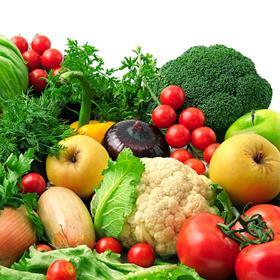
Teenage girls who eat the recommended five portions of fruit and vegetables a day could reduce their risk of breast cancer in later life by up to one quarter, a major study has found.
The research by Harvard University suggests that dietary habits in puberty and young adulthood could play a critical role affecting the chance of later developing cancer.
The study - which tracked 90,000 US women for more than two decades - found fibre from fruit and vegetables appeared to have the strongest protective effect.
Breast cancer is the most common type of cancer in the UK, with one in eight women developing it, and 50,000 diagnoses a year.
One-fifth of cases are diagnosed before the age of 50, when the disease tends to be more aggressive.
Scientists believe that fibre may protect against breast cancer by blocking the absorption of oestrogen, which is closely linked to the disease.
The new study suggests that puberty and young adulthood could be a particularly crucial window, when dietary habits have the greatest impact on the body's hormones.
Researchers tracked women for more than two decades, examining their dietary habits and lifestyles in detail.
Those who consumed the most dietary fibre in adolescence had a 24 per cent lower risk of breast cancer before the menopause, compared with those who consumed the least fibre.
And their overall lifetime risk of the disease was 16 per cent lower, the study found.
'We now have evidence that what we feed our children during this period of life is also an important factor in future cancer risk'
Dr Walter Willett, who was part of the study team, said.
Those with the highest total intake of fibre in adolescence on average consumed around 28g of fibre – almost twice as much as those with the lowest intake.
Women with high fibre intake during their 20s and 30s also had a significantly lower chance of breast cancer, between 12 and 19 per cent less than those with the lowest fibre consumption levels.
Maryam Farvid, visiting scientist and Takemi fellow at Harvard School of Public Health, said the study, published in the journal Pediatrics, is the first major research to examine links between fibre intake early in life, and later breast cancer.
'Previous studies of fibre intake and breast cancer have almost all been non-significant, and none of them examined diet during adolescence or early adulthood, a period when breast cancer risk factors appear to be particularly important,” she said.
Dr Farvid said fruit and vegetable consumption was one factor which individuals could change to reduce their cancer risk.
'This work on the role of nutrition in early life and breast cancer incidence suggests one of the very few potentially modifiable risk factors for pre-menopausal breast cancer,” she added.
The women involved in the study were aged 27 to 44. They filled out questionnaires about their food intake every four years, from 1991 onwards, as well as completing a survey about their diet during high school.
Findings were adjusted for other factors, such as family history of breast cancer, body mass index, weight change over time, menstruation history, alcohol use, and other dietary factors.
Dr Julie Sharp, head of health information at Cancer Research UK, told the Daily Telegraph further studies would be needed to confirm the findings, as they relied on women’s recall of their typical diet many years earlier.
'While there's good evidence that eating plenty of fibre can reduce your risk of bowel cancer, we don't yet understand the effects on breast cancer risk,” she said.
“This study relied on women remembering what they ate when they were younger, so we'll need follow-up studies to confirm these results. But we know that keeping a healthy body weight, cutting down on alcohol and being active can all help reduce your risk of breast cancer.”



